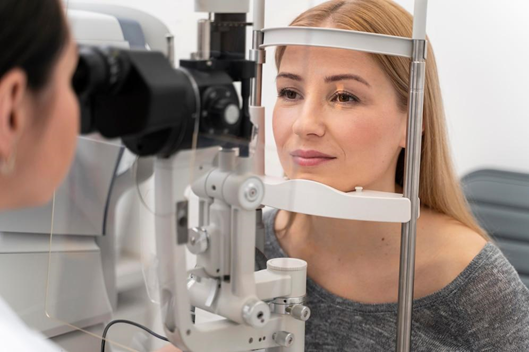Understanding Urgent Care For Eye Issues
Urgency is crucial when it comes to eye health, as sudden changes or injuries can significantly impact vision and overall well-being. Urgent care facilities specialize in addressing immediate eye issues, equipped with specialized tools and experienced professionals for swift diagnosis and treatment. These centers offer a middle ground for those unsure whether to visit the emergency room or a primary care physician, providing timely, specialized care without the need for an appointment. Understanding when and where to seek help empowers individuals to protect their vision and prevent lasting damage.
Common Eye Issues Requiring Urgent Care
Eye problems needing urgent care can range from minor irritations to serious injuries. Common issues include foreign objects like dust or sand that can cause pain or corneal scratches, infections such as conjunctivitis marked by redness or discharge, and sudden vision changes like blurriness, flashes, or floaters, which may signal retinal detachment. Other urgent concerns include chemical splashes, trauma, and severe eye pain. Recognizing these symptoms early and seeking prompt treatment is key to preventing complications and protecting vision.
The Importance Of Timely Treatment For Eye Problems
Timely treatment is essential for eye-related issues, as delays can lead to irreversible damage or even vision loss. Conditions like acute glaucoma can quickly increase eye pressure, risking permanent loss of sight without immediate care. Infections such as bacterial conjunctivitis can spread rapidly and cause significant discomfort, but early intervention can ease symptoms and prevent transmission. Prompt attention to eye trauma or foreign bodies helps avoid complications like corneal abrasions or infections. Prioritizing swift medical care is crucial to protecting vision and preserving quality of life.
When To Seek Urgent Care For Eye Issues
Knowing when to seek urgent care for eye issues is key to protecting vision and improving outcomes. Signs that require immediate attention include severe eye pain, sudden vision loss (partial or complete), and any form of eye trauma from accidents or impact. Persistent redness, swelling, or discharge—especially when paired with fever or headache—also warrants prompt evaluation. Recognizing these symptoms and acting quickly can help prevent complications and ensure effective treatment.
What To Expect During Your Visit To An Urgent Care Facility
A visit to urgent care for eye issues typically includes an initial assessment of your symptoms and medical history, followed by a thorough eye examination using specialized equipment to diagnose the problem. Treatment may involve medication, removal of foreign objects, or a referral to a specialist for advanced care. In some cases, imaging tests like Optical Coherence Tomography (OCT) or fluorescein staining may be used to detect internal damage or infections. Asking questions during your visit can help you better understand your condition, treatment options, and any necessary follow-up care, keeping you proactive in managing your eye health.
Eye Doctors’ Recommendations For Eye Health
Eye doctors stress the importance of regular eye exams to catch problems early and maintain good vision. Annual check-ups can detect conditions like glaucoma, cataracts, or macular degeneration in their early stages, often before noticeable symptoms appear. These visits also help monitor changes in vision and update prescriptions for glasses or contact lenses. Wearing protective eyewear during risky activities, such as sports, yard work, or using power tools, can prevent traumatic injuries. Additionally, maintaining a healthy lifestyle—with a diet rich in vitamins A, C, and E, staying hydrated, avoiding smoking, and managing chronic conditions like diabetes and high blood pressure—further supports long-term eye health. Following these steps helps prevent emergencies and keeps your vision strong.
Prevention Tips For Avoiding Eye Emergencies
Preventing eye emergencies starts with smart habits and protection. Use safety goggles when working with debris, chemicals, or sharp objects. Manage screen time by following the 20-20-20 rule to reduce eye strain, and adjust lighting to minimize glare. Always practice proper contact lens hygiene to avoid infections—this includes washing hands before handling lenses, using the correct cleaning solution, and replacing lenses as directed. Additionally, maintain a balanced diet rich in eye-friendly nutrients like omega-3 fatty acids, lutein, and zinc. These simple steps go a long way in protecting your eyes and supporting long-term vision health.
How To Choose The Right Urgent Care Facility For Eye Issues
Choosing the right urgent care facility for eye issues is essential. Look for centers with optometry or ophthalmology specialists, proper diagnostic equipment, and a convenient, easily accessible location. It’s also helpful to check if the facility offers extended hours or 24/7 availability, accepts your insurance, and has positive patient reviews. Considering these factors helps ensure you receive timely, high-quality care when it’s needed most.
The Role Of Technology In Eye Care
Technology is transforming modern eye care by improving diagnostics and treatment. Telemedicine enables remote consultations, especially helpful in rural areas. Advanced imaging techniques like Optical Coherence Tomography (OCT) provide detailed eye scans for accurate diagnosis. Laser treatments offer precise, minimally invasive solutions with quicker recovery. These innovations are making eye care more efficient, effective, and accessible.
Conclusion: Prioritizing Your Eye Health
Prioritizing eye health is vital to preserving our quality of life. Understanding when to seek urgent care, staying consistent with eye check-ups, maintaining healthy habits, and choosing the right care facilities all support long-term vision wellness. Incorporating protective measures, like wearing sunglasses to shield against UV rays and using safety eyewear during high-risk activities, can further safeguard vision. As technology continues to advance in ophthalmology, with innovations like telemedicine, AI diagnostics, and laser treatments, staying proactive in our eye care routines ensures we protect the windows through which we see the world.


Comments are closed.